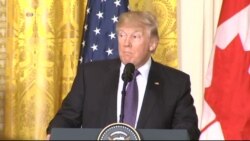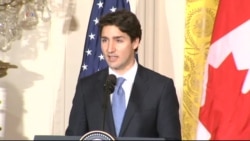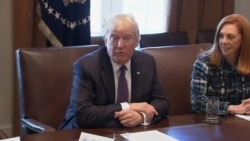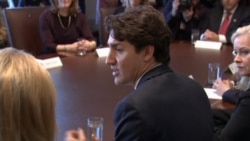U.S. President Donald Trump and Canadian Prime Minister Justin Trudeau, reaffirmed bilateral ties after meeting Monday for the first time at the White House.
Trump said North Korea is a "big problem" which he intends to deal with "very strongly".
WATCH: Trump on commitment to protect mutual interests
On immigration and national security, Trudeau said "we're very much in agreement on keeping our citizens safe."
WATCH: Trudeau on US-Canada "essential partnership"
Trade between the two neighbors was expected to be at the top of their agenda, with the new American leader looking to renegotiate or scrap the 1994 North American Free Trade Agreement that includes the United States, Canada and Mexico, to shape it on more favorable terms to the United States.
Trade relations are important to both Ottawa and Washington, with 75 percent of Canadian exports going to the United States and 18 percent of American exports sold in Canada.
Trudeau's schedule for the one-day visit also includes talks with House Speaker Paul Ryan and Senate Majority Leader Mitch McConnell.
Trudeau and Trump have adopted sharply different views on immigration, with the Canadian leader welcoming 40,000 Syrian refugees. Meanwhile, Trump is engaged in a court fight over his blocked attempt to temporarily halt travel to the U.S. from seven majority-Muslim countries with histories of terrorist attacks and suspending the country's refugee program.
Female entrepreneurs
The two leaders are meeting privately in the Oval Office and over a working lunch, attending what the White House described as a roundtable "on the advancement of women entrepreneurs and business leaders". Officials say the two countries expect to announce a new task force to promote female business leaders and entrepreneurs.
WATCH: Trump's comments at roundtable on women entrepreneurs
WATCH: Trudeau's comments at roundtable discussion
Trudeau is the third foreign leader Trump has met with since taking office last month, following a visit last weekend with Japanese Prime Minister Shinzo Abe and earlier with British Prime Minister Theresa May.
Travel ban
The U.S. leader signed an executive order suspending the country's refugee program for 120 days and indefinitely suspending it for Syrian refugees. The order also banned immigrant and non-immigrant entry for 90 days to people from Iraq, Iran, Syria, Yemen, Libya, Somalia and Sudan.
Trump says the moves are necessary to protect national security. A federal court ordered that the ban not be enforced while it is being challenged by several states, and an appeals court upheld the freeze last week. The White House has been mulling whether to appeal the decision blocking Trump's order or to rewrite it and issue a new ban. The issue could ultimately end up being decided by the U.S. Supreme Court.
Trudeau's government responded to Trump's order by offering those who would normally be allowed into the U.S. the opportunity to apply for temporary status in Canada.
A day after Trump signed the ban, Trudeau wrote on Twitter: "To those fleeing persecution, terror & war, Canadians will welcome you, regardless of your faith. Diversity is our strength #WelcomeToCanada."









